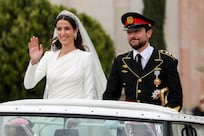For the last two decades, I have read for a living, reviewing books and interviewing writers. Then, just over three years ago, I began reading books for a living of a different sort. I became a father, and from the moment my daughter supplanted me in my office, literature has played a defining role in our relationship.
It has been the most joyous of learning curves, and the steepest too for us both. Decades have passed since I pored over Beatrix Potter. I still haven't read a Harry Potter, and am slowly accommodating myself to Gruffalos and Peppa Pig. As for reading aloud, I get stage fright with nobody there.
Reviewing those three years today, I have realised that almost every idea I had previously formed about books has been hurled out of the window. For instance, I used to snobbishly disparage graphic novels. Now, day after day and night after night, I recite stories marrying word and image in the most inextricable fashion. My equally snobbish love of poetry tends towards the modernist (free verse, ellipses, lots of foreign words), but now I mainly intone lines that not only rhymes (see!), but do so twice or even thrice (again!). "I would not like them here or there. I would not like them anywhere. I do not like green eggs and ham. I do not like them Sam-I-Am."
Read more: Is it better for your children to be reading in colloquial Arabic?
Lurking somewhere in all this, like an ogre beneath a bridge transporting the Billy Goats Gruff, is the biggest question facing writers, publishers and booksellers. Why do we read? Also: how do we read? Possibly: what do we read?
Put simply: children respond to stories in very different ways than adults do. This is partly a matter of taste. I might snicker at the hipster stylings of Oliver Jeffers' Stuck (Italian Job allusions) or the cute-horror of Jon Klassen's This Is Not My Hat, but my daughter couldn't care less about cool or irony. By contrast, most parent-readers know well the heart-sinking feeling when a child insists on a book you loathe, and more over have loathed approximately 4,578 times that week alone.
It is also a question of experience. My daughter loves books that speak to her directly. One reason she loves Maurice Sendak is that he portrays, not childhood, but being a child. This can be Max's hot-headed tantrum in Where the Wild Things Are, or (in his Little Bear tales with Else Holmelund Minarik) the tenderest of parent-child conversations: 'You are my Mother Bear, and I am your Little Bear…'
Received grown-up wisdom argues that being well-read means reading widely and diversely – knowing your Arabian Nights from your Luo Guanzhong. Flouting that paradigm, most children prefer depth to breadth. This means reading and re-reading so often, that if I attempt to skip a sentence or two of Peppa Pig in the Bookshop, I am quickly corrected.
Repetition of books applies equally to repetition in books. An early hit, Andy Pritchett's Stick!, contains just one word, uttered as question, exclamation and surprise. She loves series like Ludwig Bemelmans's Madeline, John Prentice's Fern Hollow, Eric Carle's Brown Bear Treasury, or Heather Amery and Stephen Cartwright's Apple Tree Farm which twist fresh adventures into familiar worlds.
The poet laureate of repetition, however, is Dr Theodor Seuss. Indeed, it has been 60 years since he wrote The Cat in the Hat, the masterpiece that single-pawedly changed children's literature forever. Frustrated and bored by existing children's classics like the relentlessly polite Dick and Jane series, Seuss was commissioned to write "a story that first-graders can't put down!" A year and half later, The Cat in the Cat achieved this through an anarchic spirit combining inventive, but kindly insurrection against suffocating regulation and a sense of the absurd that speaks directly to children's own reality. Just as significantly, Seuss refined how language could be unleashed. He riffed on just 236 simple words in ways that gave them vivacity and velocity. Here's the Cat tidying up: "he picked up the cake,/ and the rake, and the gown,/and the milk, and the strings,/and the books, and the dish,/and the fan, and the cup,/and the ship, and the fish." The sense is not separate from the poetry – it is the poetry, in its frenzy, motion and cheek.
Similar, if gentler power is exerted by another American classic, Margaret Wise Brown and Clement Hurd's Goodnight Moon, whose conclusion achieves more in six lines than the recently announced Man Booker longlist:
'Goodnight nobody
Goodnight mush
And goodnight to the old lady whispering "hush"
Goodnight stars
Goodnight air
Goodnight noises everywhere'
The mood shifts from absurdity (in a joke worthy of Lewis Carroll 'Goodnight nobody' is on a blank page) to the lulling diminuendo of the finale which strike an almost cosmic note. Here's a book that sends you to sleep without ever being boring.
I'll end with two lessons. One was delivered by the best adult reader I know: my father-in-law, a child care expert who once ran the day-care centre at the United Nations in New York. Have fun with the book, he told me. If the story contains a bird, flap the pages like wings. If a crocodile approaches, snap the pages like teeth. If the wind blows, shake the pages like leaves.
The other lesson, taught by my daughter, is that reading is an act of intimate, joyful and emotional communication. Sitting with a curious child, whispering stories into her ear, largely about creatures trying to be kind, compassionate, and gentle, is a privilege for which I was wholly unprepared. Books comfort and entertain, sharpen the attention and quieten the mind. If only politicians read like this, the world might be better off. And if the thought if Donald Trump reading Dr Seuss to Xi Jinping doesn't make you smile, nothing will.
Read More:
Families must take lead in UAE reading culture shift






